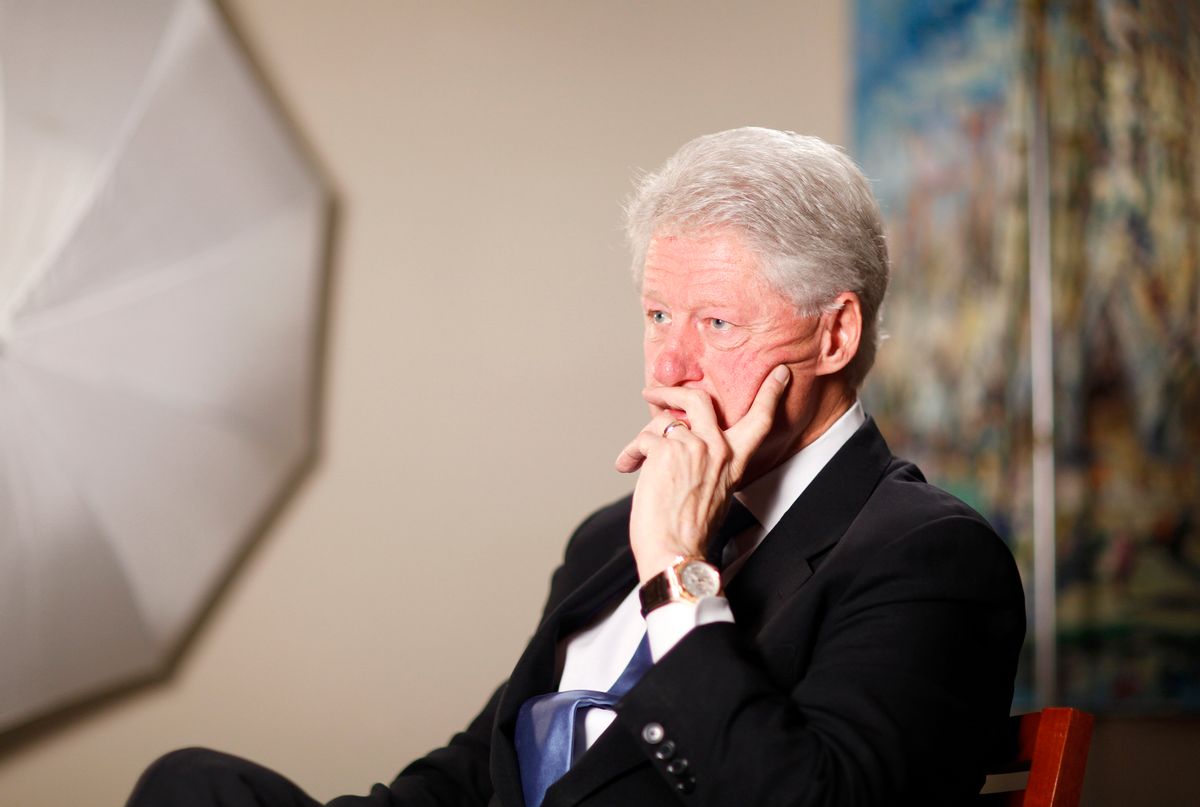In 1992, I was in 10th grade. Hence, I didn't care about much more than the girls I could never get, the Philadelphia 76ers' playoff chances, and the shortcomings of my own unimpressive basketball career (in that order) — and I certainly didn't care about politics. So when my teacher assigned me to represent a Southerner I'd never heard of in a mock presidential debate, I was, um, not psyched.
My attitude changed, though, when I started researching — wait, what was his name again? Oh, right — Bill Clinton. To my surprise, what I found was inspiring. The lip-biting saxophonist seemed like a forthright guy with some heartfelt "feel your pain" outrage at the unfairness of the moment's Gordon Gekko zeitgeist. An early campaign speech I discovered particularly captivated me — the one in which Clinton said, "I expect the jetsetters and featherbedders of corporate America to know that if you sell your companies and your workers and your country down the river, you'll be called on the carpet."
Call me crazy or gullible — at 16, I was probably both — but I bought it. If not for Clinton's campaign (and that irrepressibly optimistic Fleetwood Mac jingle), I might have followed star-crossed hoop dreams already doomed by my god-awful jump shot. Instead, I chose a political path, genuinely believing in that place called hope.
This naive faith, of course, is why I would later come to detest Bill Clinton.
Upon assuming office, he championed the very corporatist policies he railed on — lobbyist-written free-trade pacts and financial deregulation, to name two. To me, a fervent supporter turned spurned groupie, Clinton eventually looked like an opportunist who knew he was selling out — and yet sold out anyway.
Because of his reversals, I ended up in my adult years being critical of Clinton — so consistently critical, in fact, that I'm shocked to find myself about to spend the next few paragraphs praising him. No, not for his (admittedly impressive) humanitarian work, but for his recent contrition.
Whereas former presidents typically devote their retirement to history-revising legacy preservation, Clinton is laudably doing the opposite — and the nation will, hopefully, benefit.
It began with his congressional testimony last month. Discussing his administration's trade policy, Clinton admitted that it "has not worked" to alleviate poverty, as promised.
"It was a mistake," he said of his agribusiness-backed initiatives forcing impoverished countries to eliminate tariffs. "It was a mistake that I was a party to ... I had to live every day with the consequences of the loss of capacity to produce a rice crop in Haiti to feed those people because of what I did."
Clinton didn't stop there. In a subsequent ABC News interview, he said that when it came to 1990s-era financial deregulation that so harmed today's economy, "I think [my advisors] were wrong, and I think I was wrong."
Some will undoubtedly say, "Too little, too late." But with Clinton having nothing to gain from these admissions — and, really, lots to lose — the 10th-grade idealist in me says, "Better late than never."
Better he acknowledge the failure of misguided trade and deregulatory initiatives rather than pretend they succeeded. Better he apologize for the betrayals that deflated his supporters rather than feign indifference. Why? Because the penitence may now spur change.
Clinton's compunction could, for instance, help persuade President Obama to shelve new free-trade proposals and avoid undermining Congress' current financial regulatory legislation. It may compel Obama to fire the same Clinton economic aides who now work in his administration. And it might even prompt a nation of exceptionalists to admit its errors and actually reform itself.
After all, if Clinton can learn from mistakes, then America should be able to do the same.
David Sirota is the author of the best-selling books "Hostile Takeover" and "The Uprising." He hosts the morning show on AM760 in Colorado and blogs at OpenLeft.com. E-mail him at ds@davidsirota.com or follow him on Twitter @davidsirota.

Shares